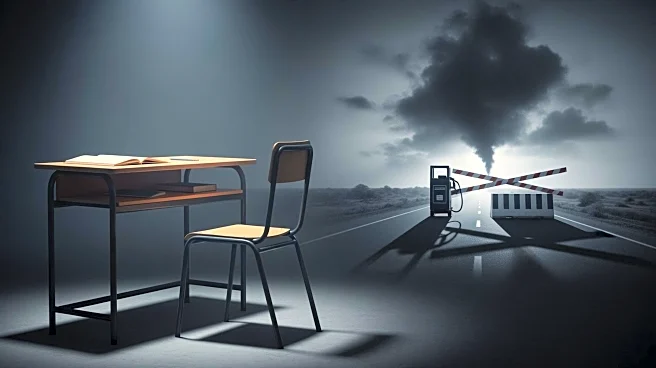What's Happening?
Mali has suspended all schools and universities nationwide due to a severe fuel shortage caused by a blockade imposed by Islamist insurgents. The blockade, led by militants from an al-Qaeda affiliate,
has targeted fuel tankers on major highways, severely disrupting fuel imports into the landlocked country. This has resulted in long queues at petrol stations and a significant reduction in traffic in the capital, Bamako. The military government, led by Gen Assimi Goïta, had previously assured residents that the issue was temporary, but the crisis has persisted. The U.S. Embassy in Bamako has announced the departure of non-essential diplomatic staff and their families due to the worsening fuel shortage and security concerns.
Why It's Important?
The fuel crisis in Mali highlights the ongoing security challenges faced by the country, which has been under military rule since a coup in 2021. The blockade not only affects daily life but also has broader implications for Mali's stability and economic activity. The disruption of fuel supplies impacts electricity generation and could exacerbate security issues, potentially affecting international relations and aid. The suspension of educational institutions underscores the severity of the crisis, affecting students and educators nationwide. The situation may also influence Mali's diplomatic ties, particularly with countries involved in peacekeeping and security efforts.
What's Next?
The Mali government is working to resolve the fuel crisis, aiming to resume classes by November 10. However, the ongoing insurgency and the departure of international forces, including the UN peacekeeping mission and French troops, complicate efforts to stabilize the region. The military government has engaged Russian mercenaries to address security concerns, but large areas remain outside government control. The international community may need to reassess its approach to supporting Mali, balancing security assistance with humanitarian needs.
Beyond the Headlines
The fuel blockade in Mali raises ethical and legal questions about the use of force by non-state actors and the impact on civilian life. The reliance on foreign mercenaries for security poses long-term implications for governance and sovereignty. Additionally, the crisis may influence regional dynamics, as neighboring countries are involved in fuel supply routes and may face similar threats from insurgent groups.












